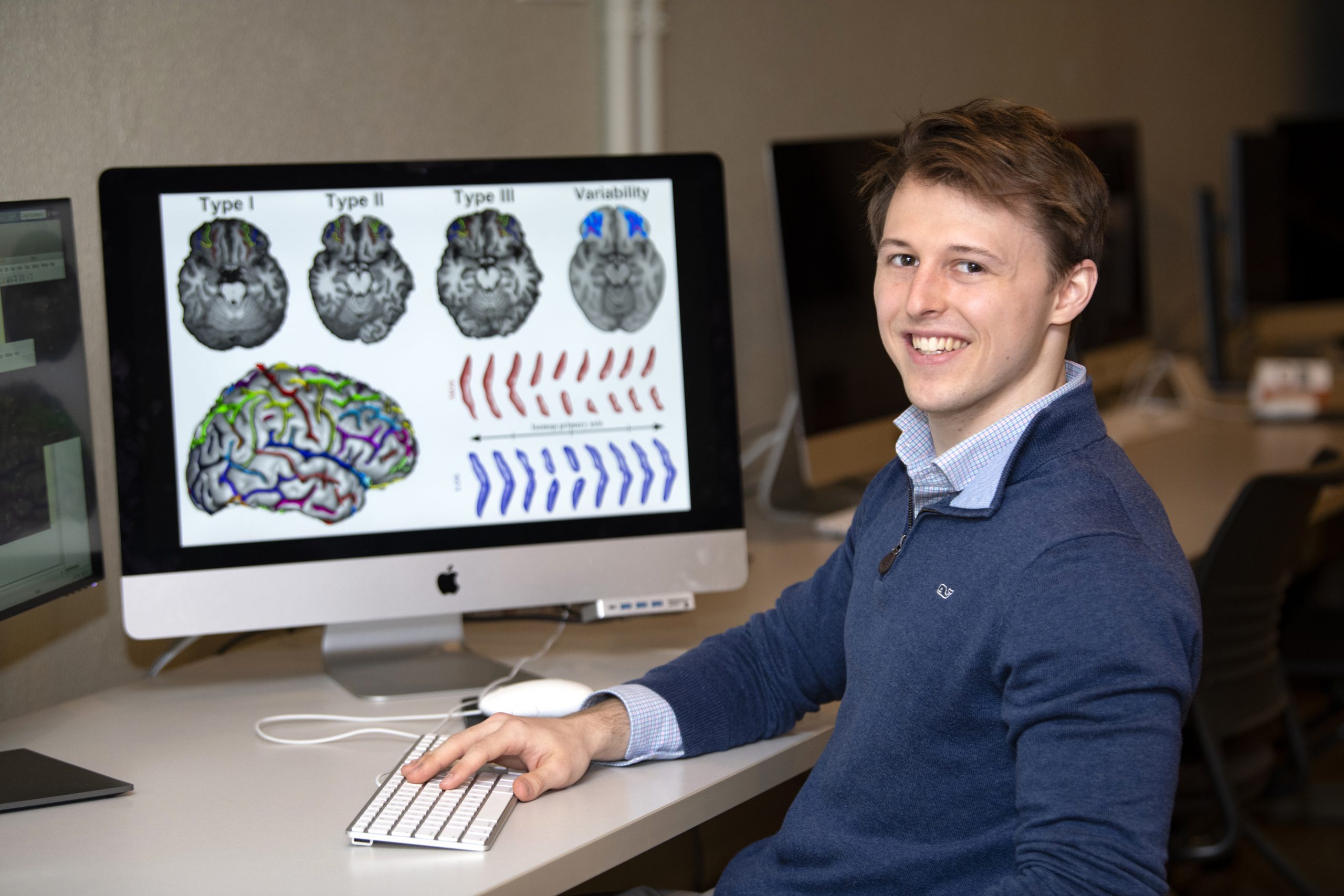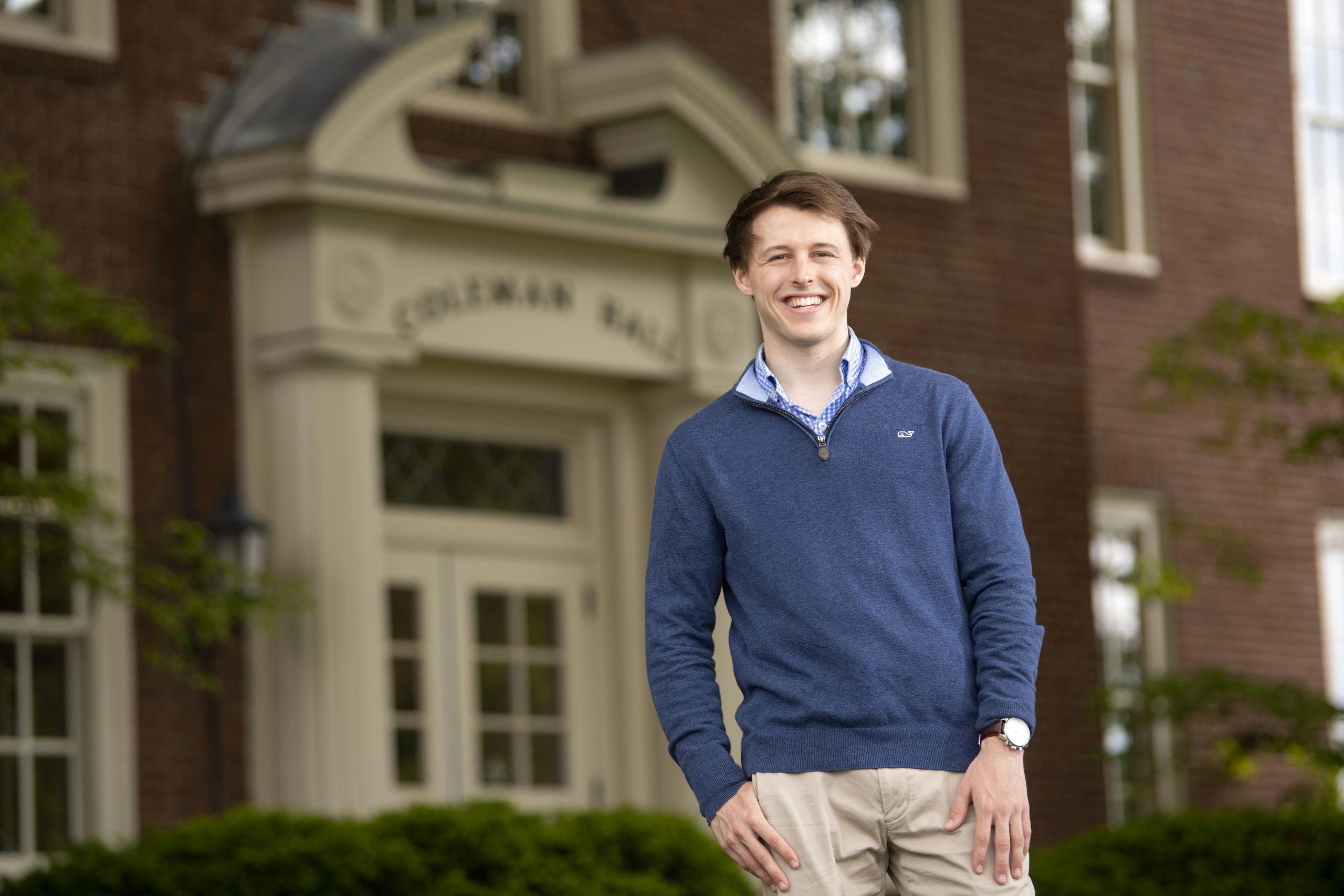
Will Snyder speaks about his early interest in neuroimaging and his research on what they can tell us about developmental disorders.
I had my own brain scanned and it is a really spiritual experience. I paid attention to every curve. Every single one feels meaningful.
Will Snyder
Will Snyder’s research is focused on understanding what brain scans can tell us about developmental disorders.
His PhD, which he began in 2021, centres on the study of brain development through graph theory analyses of brain folding and brain networks. His aim is to contribute to the growing field of precision medicine, advancing treatments for disorders based on markers in the brain.
Will [2021] is fascinated by the uniqueness of every human brain. “My work makes me acutely aware of how the brain embodies the whole of a conscious living being. I had my own brain scanned and it is a really spiritual experience. I paid attention to every curve. Every single one feels meaningful.”
He adds: “There is a really personal aspect to neuroscience and to understanding the traits of human behaviour that make us all unique.”
Early interest in neuroimaging
Will was born and raised in Severna Park, Maryland. When he was growing up his father worked in marketing technology and his mother, a psychology graduate, worked as a teaching assistant. It was through his mother’s work that he first learned about neurodevelopmental conditions and how pervasive they are.
Growing up, Will spent a lot of his time at home doing computer-based projects. He designed his own projects, such as creating iPhone apps, and became interested in using those projects to improve the lives of others. Through investigating his college options, he came across a book on neuroimaging which explained the evolution of the brain. “It asked why we are the way we are and explained how we are such efficient learners and computational processors,” says Will. It also led him to open source fMRI neuroimaging datasets and software. On a whim, he decided to download some small datasets. “They were much more accessible than I thought. You could see a real human brain and how it worked. It felt like I was doing real science,” he says.
His first project was on autism, an area which he says neuroscience has not fully addressed from a clinical perspective. “There is still a lot we need to learn about developmental disorders,” says Will. He would run brain imaging code on a family laptop overnight so he could view the results before he left for school in the morning. He says that accessibility to material shows how open and collaborative the neuroimaging community is. Having the right software and access to data meant Will was able to start asking his own questions and to work with people he had heard of in high school. That experience really motivated him, even though he was still finalising what to study at university.
His mind was made up in his last weeks of high school after participating in a county science fair, presenting on how autism symptoms map to different brain regions. That then led to the International Science and Engineering Fair in Los Angeles, where he met people from around the world. “My key takeaway from that trip was that young people have a voice in science,” says Will. “In fields where not much progress has been made young voices can challenge prevailing theories and be more bold about the hypotheses that interest them.”
Undergraduate years
Will chose to study neuroscience at Bucknell University where he explored the potential of using mathematics to advance brain mapping within MRI datasets. The university had collaborated with the nearby Geisinger Autism and Developmental Medicine Institute and Will was put in touch with Dr Vanessa Troiani at the Institute from the offset. He says her mentorship has played a formative role in his academic career to date. She helped Will to get the work he had been doing independently on brain function published and introduced him to the work her laboratory was doing on brain folding. Will interned at the Institute over his first summer vacation, working for the first time on brain folding in the orbital frontal cortex – an area which he says deserves more exploration for its connection with developmental disorders.
 Will continued to work with Dr Troiani throughout his degree, learning how graph theory methods can help scientists to understand patterns of brain folding and function that relate to psychiatric and neurodevelopmental conditions. He also did other internships. For instance, he worked with Dr Soohyun Lee’s lab at the National Institute of Mental Health, applying automated methods for large-scale calcium imaging of the somatosensory barrel cortex of mice. During summer 2020 he did a virtual internship with Dr Lucina Uddin at the University of Miami who has pioneered work on brain function and connectivity in connection with autism.
Will continued to work with Dr Troiani throughout his degree, learning how graph theory methods can help scientists to understand patterns of brain folding and function that relate to psychiatric and neurodevelopmental conditions. He also did other internships. For instance, he worked with Dr Soohyun Lee’s lab at the National Institute of Mental Health, applying automated methods for large-scale calcium imaging of the somatosensory barrel cortex of mice. During summer 2020 he did a virtual internship with Dr Lucina Uddin at the University of Miami who has pioneered work on brain function and connectivity in connection with autism.
In his final year Will took a semester out to work virtually with a group at Forschungszentrum Jülich, a research centre in Germany, which studies brain imaging and responses to different drugs used to treat psychiatric disorders, including depression. In his final semester he worked on his honours thesis on how genetically characterised developmental disorders impact the brain.
Gates Cambridge
Will applied to several scholarship programmes to do his PhD, but says Gates Cambridge was his first choice because of the chance to work with Professor Ed Bullmore and because of the links with the National Institutes of Health through the NIH Oxford-Cambridge Scholars programme. The programme brings together his interest in brain network connectivity, where Cambridge excels, and NIH’s work on brain folding genetics. “It enables me to pull together my interests and integrate them into a cohesive thesis,” he says. Both groups collaborate on analysing the UK Biobank’s huge repository of brain scans.
Will was impressed by the level of mentorship provided by Cambridge even before he applied and by the diversity of expertise available in the laboratory and through Gates Cambridge. “Neuroscience is very personal to us and is embedded in many aspects of our lives. If we are going to make progress we need an intellectually and culturally diverse community to ask the right questions,” he says.
Will, who has had a number of publications in peer-reviewed journals, including one this summer on the University of Miami project, is keen to continue in academia after his PhD. “This is work I can’t not do,” he says simply.
*Pictures credit: Emily Paine, Bucknell University.












